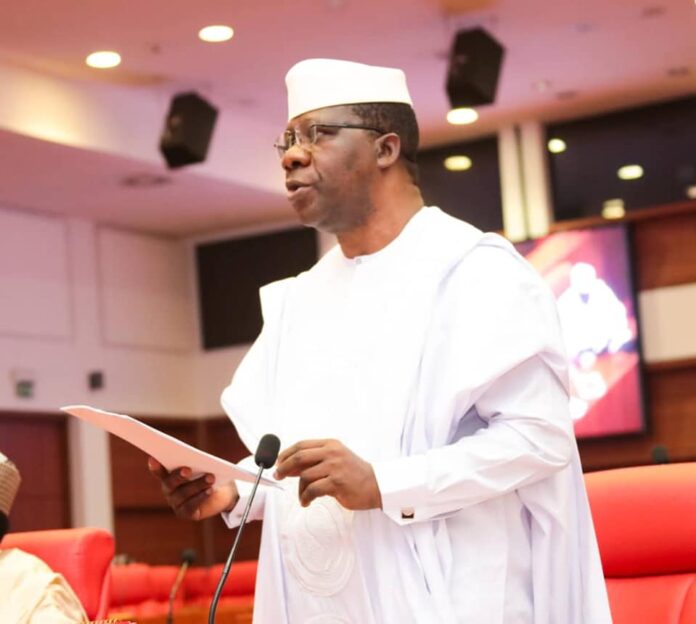A proposed overhaul of Nigeria’s Value Added Tax (VAT) sharing formula has sparked intense debate, with Lagos and Rivers States projected to suffer significant revenue losses, while states in the North stand to gain substantially. The Senate Leader, Senator Opeyemi Bamidele, disclosed the potential impacts during a statement on Christmas Day, emphasizing the reforms’ broader implications for equity and fairness.
New Sharing Formula Shifts Balance
Under the proposed model, Lagos State’s share of VAT revenue would plummet from 80.26% to a mere 15.28%, marking an 81% decrease. Similarly, Rivers State would see its allocation shrink from 7.74% to 4.6%, representing a 41% loss. In stark contrast, northern states like Kano and Zamfara would see dramatic increases, with Kano’s share rising from 0.89% to 6.17% and Zamfara’s from 0.05% to 1.21%.
Senator Bamidele defended the proposal, arguing that the new model was grounded in principles of equity. “The narrative around the new derivation model is utterly incorrect and unfounded,” he asserted. “This reform is guided by fairness, ensuring no state is unduly disadvantaged while others are enriched.”
Public Concerns and Lawmakers’ Opposition
Not all lawmakers are in support of the reform. Senator Ali Ndume, among others, has expressed concerns that the new VAT formula could exacerbate economic disparities, particularly for states in the North. However, Bamidele reassured Nigerians that the National Assembly was committed to considering public concerns.
“As democrats, our duty is not just to listen to our constituents but to effect policy initiatives that positively impact their lives,” Bamidele stated. He also highlighted that the bills exempt employees earning less than ₦1,000,000 annually, start-ups, and essential services from VAT.
‘A Rich Man’s Tax,’ Says Finance Committee Chair
The Chairman of the House of Representatives Committee on Finance, Dr. James Abiodun Faleke, also weighed in, dispelling fears about the impact on ordinary Nigerians. Speaking to his Ikeja Federal Constituency, he emphasized that most goods and services affecting everyday citizens, such as food, education, public transportation, and medical care, would remain VAT-free.
“VAT is what I call the rich man’s tax,” Faleke explained. “Items exempted from VAT are those directly consumed by ordinary Nigerians, provided they aren’t resold in hotels or upscale restaurants.” He described the proposal as a measure to harmonize taxes and redistribute wealth, ensuring no state has an undue advantage.
Religious and Economic Leaders Support Reform
Prominent religious leader Archbishop Timothy Yahaya of the Anglican Communion in Kaduna Province also lent his voice in support of the bills. However, he criticized the culture of revenue-sharing among states, urging leaders to focus on wealth creation.
“States should prioritize production,” Yahaya stated. “Some states could specialize in cocoa, rubber, or rice, which we can export. Our leaders must think beyond sharing federal revenue.”
The Archbishop also called for national unity and resilience, offering a Christmas message of hope. “Fear not. The God that has been with Nigeria since creation will guide us through this storm. A better Nigeria lies ahead,” he said.
Reform Aims to Drive Investment and Equity
Beyond VAT adjustments, the Tax Reform Bills encompass broader measures designed to foster a business-friendly environment. According to Bamidele, the bills include provisions such as zero VAT on essential services, exemptions for start-ups, and incentives for technologically driven enterprises.
“Our reforms are aimed at creating an environment where businesses can thrive, investors feel confident, and Nigerians can live without undue economic burdens,” Bamidele remarked. He also linked the reforms to a larger legislative agenda, including the National Minimum Wage Act and the Investment and Securities Act.
Regional Implications of Revenue Redistribution
The proposed reforms have reignited discussions about economic imbalances between Nigeria’s regions. Lagos and Rivers, economic powerhouses, have long been the largest contributors to the national VAT pool, leveraging their high levels of industrialization and commerce. Critics argue that the reforms could disincentivize these states from driving economic growth if their contributions are not proportionally rewarded.
However, proponents see the reforms as a step towards narrowing the gap between resource-rich and resource-poor states. By redistributing VAT revenues, the bills aim to provide northern states with greater financial autonomy, potentially reducing their reliance on federal allocations.

